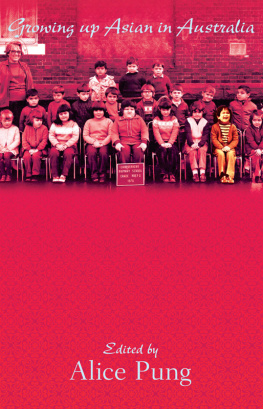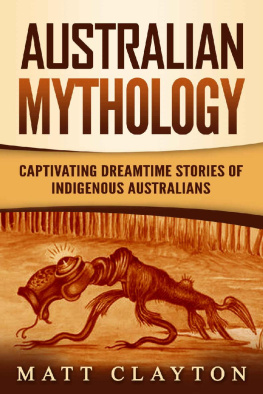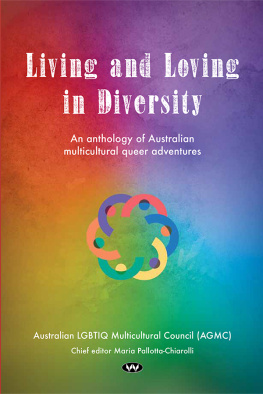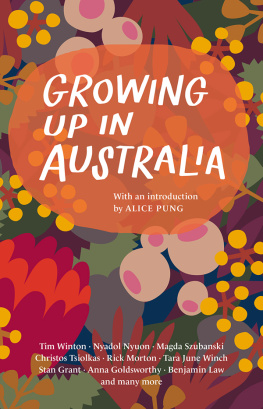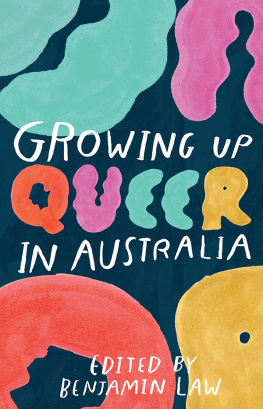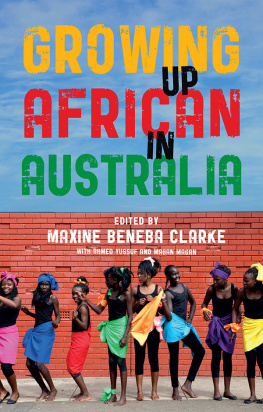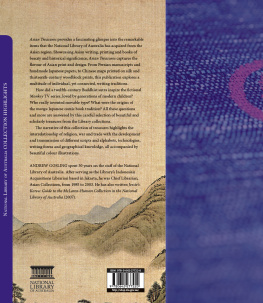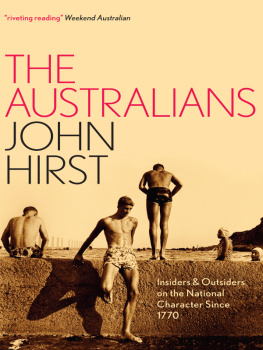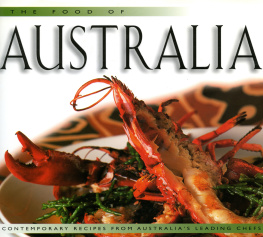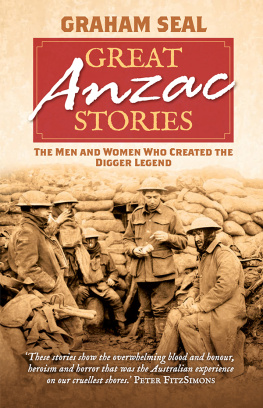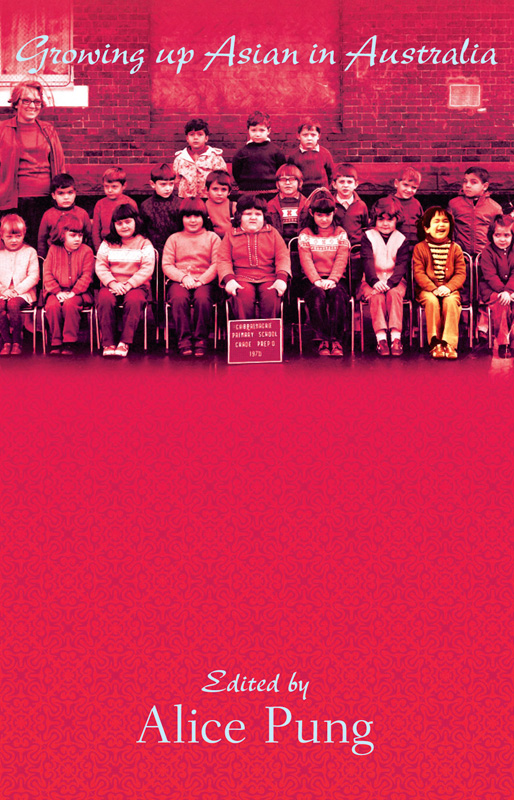
Growing up Asian in Australia
Growing up Asian
in Australia
......................................
Edited by
Alice Pung

Published by Black Inc.,
an imprint of Schwartz Media Pty Ltd
Level 5, 289 Flinders Lane
Melbourne Victoria 3000 Australia
email: enquiries@blackincbooks.com
http://www.blackincbooks.com
Introduction and this collection Alice Pung & Black Inc. 2008.
Individual works retained by the authors.
Reprinted 2008.
ALL RIGHTS RESERVED.
No part of this publication may be reproduced, stored in a retrieval system, or transmitted in any form by any means electronic, mechanical, photocopying, recording or otherwise without the prior consent of the publishers.
Photo of Hoa Pham by Alister Air. Photo of Joy Hopwood by Yanna Black.
The National Library of Australia Cataloguing-in-Publication entry:
Pung, Alice (ed.)
Growing up Asian in Australia.
ISBN 9781863951913
1. Pung, Alice. 2. Asians Australia Social life and customs.
3. Immigrants writings Australia. 4. Asians Australia Literary collections. 5. Race relations Australia. 6. Australia Social conditions.
A820.80355
Book design: Thomas Deverall
Typeset by J&M Typesetting
Printed in Australia by Griffin Press

Dedicated to all Asian-Australians, whose struggles,
aspirations and hopes across the generations have
helped make this an ace country in which to grow up.
For Alexander, Alison and Alina, who make life
wonderful, because they are.
Contents
Alice Pung
Amy Choi
Sunil Badami
Tom Cho
Ivy Tseng
Ken Chau
Francis Lee
Thao Nguyen
Christopher Cyrill
Simon Tong
Hop Dac
Annette Shun Wah
Lily Chan
Kevin Lai & Matt Huynh
Aditi Gouvernel
Oliver Phommavanh
Ray Wing-Lun
Tanveer Ahmed
Vanessa Woods
Simone Lazaroo
Rudi Soman
Oanh Thi Tran
Bon-Wai Chou
Mia Francis
Benjamin Law
Ken Chau
Diem Vo
Ken Chan
HaiHa Le
Phillip Tang
Shalini Akhil
Cindy Pan
Chin Shen
Glenn Lieu & Matt Huynh
Benjamin Law
Chi Vu
Xerxes Matza
Lian Low
Jenny Kee
Uyen Loewald
Leanne Hall
Tony Ayres
James Chong
Mei Yen Chua
Michelle Law
Joo-Inn Chew
Diana Nguyen
Pauline Nguyen
Paul Nguyen
Emily J. Sun
Kylie Kwong
Blossom Beeby
Jacqui Larkin
Sim Shen
When I was growing up, we were called Power-Points. I thought it was because we were so smart and dweeby in a dynamic Microsoft-magnate sort of way. All that untapped potential! All that electrifying brain power! Then someone pointed to an Australian power socket, and told me to take a closer look. Imagine that if it was a face, they said, think about what kind of face it would be. They saw two sloping lines and one straight down the middle, and thought it was hilarious. I didnt get it, because the power socket was white.
In fact, if there was any kind of face on it, it looked vacuously cute, like most of the lead characters in the teen fiction I was reading at the time. After a while with the exception of Claudia from the Babysitters Club, who was Asian and funny, good at art and bad at maths most teen fiction gave me the idea that I needed extensive plastic surgery. So I stopped reading those books and turned to John Marsden and Robert Cormier instead, who wrote with raw honesty and real feeling about coming of age.
Growing up is a funny time. During no other period will we experience so many firsts: first day at school, first friend, first love, first fear, first heartbreak, first loss, first epiphany. This anthology is a book of firsts all from a uniquely Asian-Australian perspective. Whether growing up in the 1950s with ancestry from the gold-rush days, or arriving more recently and attempting to find solidarity in schoolyard friendship, our authors show us what it is like behind the stereotypes. Asian-Australians have often been written about by outsiders, as outsiders. Here, they tell their own stories. They are not distant observers, plucking the most garish fruit from the lowest-hanging branches of an exotic cultural tree. These writers are the tree, and they write from its roots.
The poet Horace said Mutato nomine de te fabula narratur: Change only the name and this story is also about you. I felt this way when reading many of these stories. Compiling this anthology also made me more aware of the difficulties faced by earlier generations of immigrants parents, grandparents and great-grandparents. Even with our mastery of Strine, those born in Australia in the past four decades find it difficult to be Asian-Australian. Imagine what it must be like for Asian-Australians who didnt and still dont have the language. Usually, it is the second generation that accumulates enough cultural capital to be able to put their parents experiences into words. They also have their own stories to tell about mediating between two cultures. Stories such as Thao Nguyens Water Buffalo and Pauline Nguyens The Courage of Soldiers explore the generational divide with compassion, while Mia Franciss ode to her adopted son and Blossom Beebys acceptance of her adopted heritage move us with their unassuming love.
This collection also reveals that there is more than one voice within any given culture from Tom Chos brilliant satirical surrealism to Vanessa Woodss wonderful self-deprecating humour, from Paul Nguyens aching account of adolescent loneliness to Chi Vus bewildered young lovers, from Hoa Phams painful personal journey towards acceptance to Francis Lees arrival in the Upside-Down Year of 1961, and from Jenny Kees jubilant adolescent sexual awakening to Quan Yeomans insightful meditation on art and family. As Benjamin Law tentatively steps towards manhood with Mariah Careys Music Box blaring in his ears, as Shalini Akhil works towards becoming Indian Wonder Woman, as Annette Shun Wah helps run her family chicken farm, and as HaiHa Le leaves Jehovah to become an actress these stories show us what it is like beyond the stereotypes.
I have arranged the anthology around loose themes selected with a certain irony, picking out traits that have been worthy of collective national pride the Battler, the Pioneer, the Legend to show that these heroic characteristics are not confined to those with white faces and First-Fleet heritage.
Strine explores the difficulties of navigating a different language: Ivy Tseng receives careful Chinese lessons from her father, Sunil Badami tries to change his name, and Amy Choi reminisces about her late grandfather. Pioneers includes Ken Chaus personally political poems, their impact like a punch to the gut, while Simon Tong surmounts a loss of words through sheer will and quiet observation, and Christopher Cyrill shows that a sense of home can be tied to, but can also transcend, the physical landscape. Battlers
Next page
